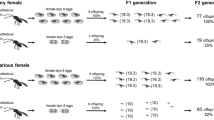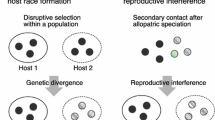Summary
We apply a theory for the computation of reproductive success for insects whose offspring can move from the host on which they hatch to compute the expected reproductive success associated with two kinds of oviposition behaviour. In the first type, accept or reject (AR), the ovipositing female either accepts a host for oviposition and lays her entire egg complement or rejects the host for oviposition. In the second type, clutch optimization (CO), the ovipositing female adjusts clutch according to host properties. The strongest prediction of our theory is that parasites which are both pro-ovigenic (emerge with essentially a full complement of eggs) and use the AR behaviour will be very rare.
Similar content being viewed by others
References
Charnov, E.L. and Skinner, S.W. (1985) Complementary approaches to the understanding of parasitoid decisions.Environ. Entomol. 14 383–91.
Mangel, M. (1987) Oviposition site selection and clutch size in insects.J. Math. Biol. 25, 1–22.
Mangel, M. and Clark, C.W. (1988)Dynamic Modeling in Behavioural Ecology. Princeton University Press, Princeton, NJ, USA.
Powell, J.A. and Common, F.B. (1985) Oviposition patterns and egg characteristics of Australian Tortricine moths.Aust. J. Zool. 33, 179–216.
Roitberg, B.D. and Mangel, M. (1993) Parent—offspring conflict and life history consequences in herbivorous insects.Am. Nat., (in press).
Smith, J.M. and Schmidt, J.J.B. (1987) The effect of host spacing on the clutch size and parasitization rate ofTrichogramma minutum.Entomol. Exp. Appl. 43, 125–31.
Tatar, M. (1990) Behavioral constraints on clutch optimization (unpublished).
Thompson, J.N. (1982)Interaction and Coevolution. Wiley, NY, USA.
Thompson, J.N. (1988) Evolutionary ecology of the relationship between oviposition preference and performance in phytophagous insects.Entomol. Exp. Appl. 47, 3–14.
Author information
Authors and Affiliations
Rights and permissions
About this article
Cite this article
Mangel, M., Roitberg, B.D. Larval life-styles and oviposition behaviour of parasites and grazers. Evol Ecol 7, 401–405 (1993). https://doi.org/10.1007/BF01237871
Issue Date:
DOI: https://doi.org/10.1007/BF01237871




